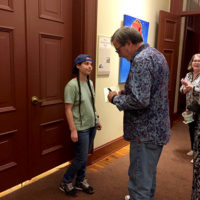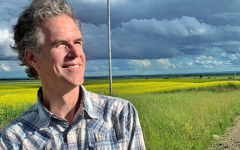
Alani Sugar with Che Apalache and friends at the Hill Center in Washington, DC – photo by David Morris
I saw the future of bluegrass the other night, just a few blocks from the nation’s Capitol.
It was in the form of Alani Sugar, a recent high school graduate parked in a front row aisle seat for a show at the Hill Center by the Latin grass quartet Che Apalache. I’ve seen her before, at jams, festivals, and music camps. But what caught my attention this night, was the navy blue ball cap that she wore backwards, her down-to-her-waist braided ponytails spilling out the sides. The embroidery on the front spelled out, “Bill Monroe & His Bluegrass Boys.”
Forget for a moment that Monroe called his band the “Blue Grass Boys.” Here was a young woman who was born several years after Monroe’s death, paying homage to him and the brand of music he invented, while dancing in her seat to a form of music that traditionalists don’t even recognize as bluegrass. You just don’t seen many 18 year olds wearing a Bill Monroe cap.
I’m a big fan of this band after spending a week with them at a music camp this summer, a week that included a string of late-into-the-night jams. But some folks turn up their noses and walk out in disgust during shows on the band’s current tour. That’s mostly because of the band’s liberal leanings that aren’t masked in their music. Then again, a song sung in Japanese, with the percussive melody played above the nut on guitar and below the bridge on mandolin, might not be for everybody.
Nobody left last Tuesday’s soldout show early. If they had, they would have missed some powerful bluegrass that would have pleased the staunchest traditionalists, including a Monroe Brothers duet – the high lonesome sound with Argentinian accents! – a lively version of a Flatt and Scruggs standard, Head Over Heels, and a stirring encore of the Ralph Stanley and the Clinch Mountain Boys arrangement of Gloryland. The four-part a cappella harmonies were spellbinding.
Sugar took it all in with what seemed to be a permanent smile and a right foot that kept perfect time.
“I love them,” she told me after the show as she waited in line for band members to sign her Bill Monroe cap alongside other artists she admires, including Sierra Hull and Patrick McAvinue.
Sugar’s trip to bluegrass, both traditional and progressive, was the result of a happy accident. She played classical violin in school orchestras. But when it came time for outside lessons, McAvinue was the instructor with room for her at a local music shop. He fed her a regular diet of bluegrass, old time, and Irish fiddle tunes, and she feasted on it.
After McAvinue moved to Nashville a while back to join Dailey and Vincent, she continued exploring bluegrass and old time on her own, traveling to festivals, entering band and instrument contests, and attending music camps.
Sugar met Joe Troop and the rest of Che Apalache last year at Galax and became an instant fan. This year, in a contest at the Deer Creek Fiddlers Convention, she won tuition for a week at Common Ground On The Hill, a music and arts camp in Westminister, MD. She picked the week that band members were booked as instructors.
On Facebook and YouTube, Sugar is in the midst of an impressive project – recording and posting a fiddle tune for every day of 2019. That’s quite a set list!
Sugar is quick to answer questions, so it surprised me when a seemingly simple one stumped her: Do you prefer traditional bluegrass, progressive grass, or old time music?
“That’s a really good question,” she finally said. “I haven’t really figured out my style yet. I like all of it.”
She not only likes it. She’s immersed in it. There’s room in her definition of bluegrass for Bill Monroe and for Che Apalache.
Isn’t that how it should be, with an emphasis on how good the music is, not what it’s called?
I came away from the show convinced that Alani Sugar and Che Apalache teach an important lesson – that we can honor the pioneers of bluegrass without copying them lick for lick or word for word.
Turns out, the high lonesome sound is beautiful in any language.










